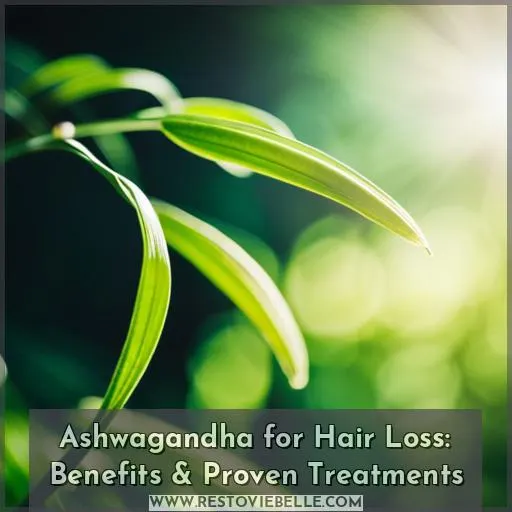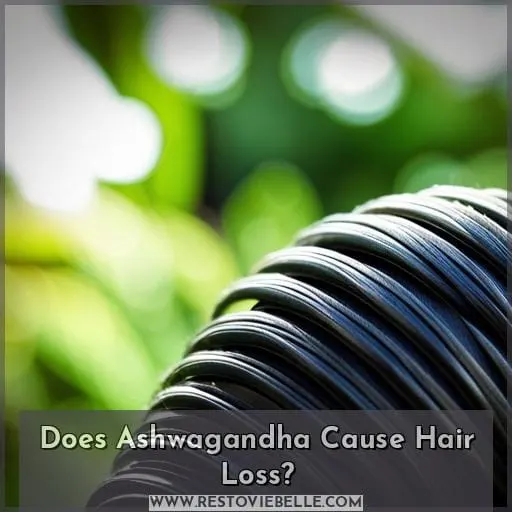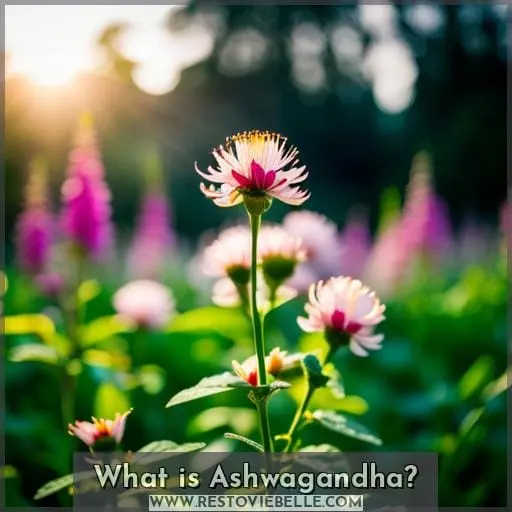This site is supported by our readers. We may earn a commission, at no cost to you, if you purchase through links.
 Are you looking for an all-natural solution to hair loss? Ashwagandha might just be the answer. This herb, commonly used in Ayurvedic medicine, has been known to provide multiple health benefits – including aiding in treating hair loss.
Are you looking for an all-natural solution to hair loss? Ashwagandha might just be the answer. This herb, commonly used in Ayurvedic medicine, has been known to provide multiple health benefits – including aiding in treating hair loss.
In this article, we’ll discuss the potential of ashwagandha and its effectiveness when it comes to reversing or preventing thinning hair.
Table Of Contents
- Key Takeaways
- Benefits of Ashwagandha for Hair
- How to Use Ashwagandha for Hair
- Does Ashwagandha Cause Hair Loss?
- Ashwagandha Dosage for Hair Loss
- Proven Ways to Treat Hair Loss
- What is Ashwagandha?
- How Can Ashwagandha Help With Hair Loss?
- Can Ashwagandha Hair Loss Treatment Work for Every Type of Alopecia?
- Can Ashwagandha Reverse Grey Hair?
- How to Use Ashwagandha Hair Loss Products?
- How Much Ashwagandha Can You Consume?
- Can Ashwagandha Cause Hair Loss?
- Frequently Asked Questions (FAQs)
- What are the potential side effects of consuming ashwagandha?
- Does ashwagandha work for all types of hair loss?
- How long does it take to see results from ashwagandha for hair loss?
- Are there any contraindications for taking ashwagandha for hair loss?
- Can ashwagandha be used in conjunction with other treatments for hair loss?
- Conclusion
Key Takeaways
- Ashwagandha is an Ayurvedic herb that can help with hair loss.
- It reduces stress levels linked to hair loss by targeting cortisol.
- It is recommended to take up to 500mg twice daily for stress management.
- Ashwagandha may be effective for hair conditions such as telogen effluvium and nutritional deficiency.
Benefits of Ashwagandha for Hair
Discover the power of ashwagandha to reduce stress, improve scalp health, and potentially give your hair new life. This Ayurvedic approach has been used for centuries to treat various ailments. Used orally or topically, it is derived from Ashwagandha root that helps boost energy levels while reducing inflammation and easing anxiety, addressing multiple factors linked with hair loss due to high cortisol levels caused by stress.
Specialists recommend a dosage of up to 500mg twice daily as an adaptogen targeting both issues. However, caution should be taken when pregnant or nursing, as well as those with thyroid problems or blood pressure issues.
Other treatments like minoxidil promote better circulation to encourage growth, while spironolactone mitigates against shedding related to androgens. Yet, these should be balanced alongside hydration with specialized shampoos, plus biotin supplementing healthy regrowth at the root causes level.
With careful consideration regarding potential side effects, this herbal remedy may offer promising results if administered correctly, restoring balance for healthier-looking locks!
How to Use Ashwagandha for Hair
If you’re looking to take your hair health up a notch, try adding ashwagandha capsules to your routine. Ashwagandha is an ancient Ayurvedic herb used for centuries in treating various conditions and boasts adaptogenic properties that target stress and inflammation.
Benefits include improved energy, reduced inflammation, increased vitality, and resistance to stress-related hair loss when taken orally or as part of topical applications such as shampoo with paste or mix with water/coffee.
However, it’s important to consider the side effects associated with taking this supplement—diarrhea, vomiting, or upset stomach may occur—as well as any dietary needs like biotin supplementation before beginning a regimen of ashwagandha use for hair care purposes.
Additionally, cautionary measures should be taken if you are pregnant/nursing, immunosuppressed, diabetic, have thyroid issues, high blood pressure, etc., so consulting a doctor is recommended prior to usage given its Ayurvedic medicine origin.
In short, consider the risks before using this herbal approach, but also note that incorporating ashwagandha into one’s diet may help reduce shedding from stress-induced cases of alopecia while also providing other benefits related to improving scalp health – ultimately leading one toward healthier locks!
Does Ashwagandha Cause Hair Loss?
You may be wondering if ashwagandha causes hair loss. It’s important to understand the root cause of any type of hair loss before trying an herbal remedy like ashwagandha. Hair shedding can be caused by dietary sources, environmental factors, hormonal changes, or a lack of hair nutrition and scalp health.
In some cases, stress can also contribute to thinning or balding due to elevated cortisol levels that impact the follicles and lead to reversible alopecia areata (patchy) or telogen effluvium (diffused).
Ashwagandha’s anti-inflammatory properties reduce inflammation in the scalp, which may help prevent further damage from occurring. Its adaptogenic qualities promote better stress resistance for those dealing with high levels of mental distress, as well as reducing overall anxiety symptoms.
| Dietary Sources | Environmental Factors | Hormonal Changes | |
|---|---|---|---|
| Yes | Yes | Yes | Yes |
However, it should not be used if you have thyroid issues, are pregnant/nursing women, immunosuppressed, diabetic, or taking blood pressure medications. If using it for pattern baldness, consult your doctor first because prolonged use could potentially result in DHT-related problems.
Although evidence suggests this is rarer when taken orally than applied topically, follow dosage instructions accordingly.
In addition, other treatments such as minoxidil, spironolactone, specialized shampoos, biotin, etc., address specific types more effectively than herbs alone. Ashwagandha might just provide a helpful boost on top of these, but ultimately addressing underlying causes will give the best results.
Ashwagandha Dosage for Hair Loss
Feeling the effects of hair loss? Consider supplementing your routine with ashwagandha to help reduce stress and keep your locks strong.
An ancient Ayurvedic adaptogen, this herb has been used for centuries as an herbal remedy to improve follicle health and prevent baldness. With its antioxidant and anti-inflammatory properties, it can also promote scalp health while reducing cortisol levels linked to stress-related hair shedding.
The safe dosage amount is around 500mg twice daily – although consult a doctor regarding any medical conditions or medications before taking it. Additionally, explore other proven treatments such as minoxidil or spironolactone that may be more suitable depending on what’s causing the problem in the first place – hormonal balance, thyroid issues, etc.
Ashwagandha for hair loss might just be one part of a larger treatment plan involving dietary changes alongside specialized shampoos and conditioners, along with biotin supplements too! To ensure you get maximum benefit from this ayurvedic medicine without side effects, always start small then gradually increase until you find what works best for you so as not to miss out on its potential stress reducer benefits!
Proven Ways to Treat Hair Loss
Are you losing your hair? Minoxidil, spironolactone, specialized shampoos and conditioners, biotin— these are some of the proven treatments to help treat hair loss. Additionally, ashwagandha is an Ayurvedic herb that has been associated with stress reduction and other health benefits.
Understanding these options can help you decide which treatment plan might be right for you.
Minoxidil
Minoxidil is a reliable option for treating hair loss – it’s like supercharging your follicles! DHT effects can be combatted with topical minoxidil, encouraging healthy hair growth. Dosage safety should be taken into consideration. Spironolactone reduces shedding by mitigating androgenic activity.
Herbal benefits, such as ashwagandha, may also support scalp health, but they are not effective for genetic or traction alopecia. Specialized treatments are required for hormonal imbalances causing androgenetic alopecia to prevent further damage from occurring due to hereditary baldness.
Minoxidil use must be monitored closely by a medical professional to ensure the best results in combating hair loss issues without any potential side-effects on other areas of health.
Spironolactone
Another treatment for hair loss is spironolactone, which can reduce shedding by mitigating androgen effects. It may help to stop telogen effluvium and premature graying in some cases. It also helps suppress cortisol levels while reducing DHT levels at the same time.
In addition, it works as an inflammation reducer that targets both anxiety and hair follicle health.
Hair Loss Shampoo and Conditioner
Specialized shampoos and conditioners can help nourish the hair follicles, soothe your scalp, and hydrate for healthy locks. Aided by herbal remedies or medications to treat hair loss? Many products contain key ingredients like biotin to encourage growth while mitigating shedding due to stress-related issues or nutritional deficiency.
Used in conjunction with other treatments addressing the root causes of hair loss, these specialized shampoos are essential for restoring balance during a fragile hair growth cycle.
Biotin
Biotin is a popular supplement to help nourish hair follicles for healthier growth. It’s an adaptogenic herb that boosts scalp health, the immune system, and thyroid functioning. When added to morning coffee or taken as a pill with dosage caution, it can prevent DHT conversion linked to thinning hair.
Hair growth benefits are also observed through herbal remedies like ashwagandha root extract – although more research needs to be done on its effects on DHT-related shedding.
What is Ashwagandha?
Discover how an ancient Ayurvedic adaptogen might be used to address stress-related hair loss. Ashwagandha, known as Indian Winter cherry or Indian Ginseng, is a popular herb in the traditional medical system of Ayurveda.
It’s derived from ashwagandha root and has been used for centuries to enhance energy levels, reduce inflammation, and ease anxiety caused by chronic stress.
In addition, studies have shown that its adaptogenic properties can help balance hormones associated with premature greying or alopecia areata. These conditions occur when grey hairs start sprouting due to age-related changes in hormonal balance.
Research also suggests that it may even promote regrowth of lost hair due to scalp infections or other forms of baldness, such as androgenetic alopecia, if taken consistently over time while following a healthy diet plan.
Coupled with regular physical activity regimes like Yoga Asanas for overall wellbeing, along with meditation practice for mental clarity and inner peace, it can simultaneously address issues related to emotional trauma, etc.
However, caution should still be exercised when taking this herb since large doses could cause stomach issues, including diarrhea and vomiting. Pregnant/nursing women, diabetics, and immunosuppressed individuals should avoid consuming Ashwagandha supplements without consulting their doctor first.
It is advisable not only to consult your physician but also to explore various treatment options available before making any decisions regarding the use of this particular remedy.
How Can Ashwagandha Help With Hair Loss?
Ashwagandha is an ancient Ayurvedic adaptogen, long used to reduce stress and improve thyroid health, as well as increase red blood count. As a result, it has become popular for its potential in preventing hair loss related to these issues.
Reduces Stress
Unlock the power of Ayurveda with Ashwagandha to reduce your stress levels and help prevent hair loss! This ancient remedy has been used for centuries, and its adaptogenic properties target stress, inflammation, hormone balance, and thyroid health.
Benefits of Ashwagandha include:
- Anxiety relief
- Cortisol reduction
- Stimulation of DHT levels in a healthy way.
With regular use, it may even prevent premature greying due to increased antioxidant activity in the scalp.
Stress management is essential for overall wellbeing. Add Ashwagandha to your daily routine as part of an effective stress-reduction strategy without worrying about potential side effects such as Androgenetic alopecia or other issues affecting hair growth.
Improves Thyroid Health
By improving thyroid health, ashwagandha can be a game-changer for your hair loss woes – like a breath of fresh air. An Ayurvedic medicinal herb, it’s known to reduce stress levels and lower DHT levels in the body, helping prevent premature greying and other types of hair loss.
Herbal treatments are often preferred over prescription medicines, but they should only be taken after consulting an expert regarding dosage and side effects. Ashwagandha is especially effective for those with thyroid issues or who suffer from high levels of stress due to lifestyle changes or burnout.
Give this Ayurvedic approach a try – you may find it immensely beneficial!
Increases Red Blood Count
Experience the potential of ashwagandha to increase your red blood count. Here are the benefits: 1) Boosts blood circulation; 2) Balances hormones; 3) Enhances scalp health; 4) Lowers DHT levels. The herbal remedy’s adaptogenic properties may help prevent greying, and clinical evidence supports its efficacy through peer-reviewed studies, medical research, and centuries of traditional use.
Can Ashwagandha Hair Loss Treatment Work for Every Type of Alopecia?
Are you looking to treat hair loss? Ashwagandha may be able to help with Telogen Effluvium, Pattern Baldness, Traction Alopecia, Nutritional Deficiency, and Alopecia Areata. Before exploring this treatment option further, it is important to understand the types of alopecia that ashwagandha can address.
Telogen Effluvium
You may suffer from telogen effluvium if you experience stress-related hair shedding. Ayurvedic science links this condition to scalp health, DHT levels, and energy. Ashwagandha benefits the body through its adaptogenic properties, potentially aiding in premature graying and hair loss prevention for those with medical conditions.
Herbal remedies can help reduce inflammation while improving overall well-being. Consult a doctor before using ashwagandha for telogen effluvium or any other type of alopecia as a treatment option to ensure safety and efficacy.
Pattern Baldness
Pattern baldness, a common form of hair loss caused by genetics, affects up to 70% of men and 40% of women. It is characterized by premature thinning or an irreversible receding hairline due to hormone imbalance and elevated DHT levels.
Ayurvedic science suggests that ashwagandha may help reduce stress-related effects on scalp health, such as greying or thinning. It can be used in tandem with shampoos containing amino acids for further benefits.
However, caution should be taken when using ashwagandha supplements due to potential side effects. Careful consideration should also be given if suffering from any other medical conditions prior to exploring this natural approach towards addressing pattern baldness issues.
Traction Alopecia
Although traction alopecia is often caused by tension on the scalp, there may be an Ayurvedic approach to reducing it. Ashwagandha’s adaptogenic properties can help improve scalp health and support hair regrowth.
It inhibits DHT production and helps balance testosterone levels, which can reduce cap dilution from pulling or styling hair. Additionally, it reduces inflammation and irritation of the scalp due to its antioxidant properties.
This can result in healthier-looking locks with fewer potential issues like breakage or thinning strands resulting from traction-related problems.
Nutritional Deficiency
Nutritional deficiencies can cause hair loss, so make sure to eat a balanced diet for optimal scalp health. Eating foods rich in vitamins A, B-complex, C, and E boosts the immune system and encourages healthy hair growth.
Consuming iron-rich food sources or taking mineral supplements may help with regrowth too. Additionally, Ashwagandha (Indian Winter Cherry/Ginseng) can provide an energy boost while helping to boost immunity against nutritional deficiency-related alopecia.
Alopecia Areata
Alopecia areata is an autoimmune condition causing hair loss in patches. Ashwagandha’s stress-reducing benefits may be beneficial, and its FDA classification as a food, not a drug, makes it an accessible option.
Thyroid symptoms, DHT levels, and hair regrowth can all improve with stress reduction and nutritional needs met through ashwagandha products or other scientific treatments. Still, effective use requires medical interactions for the best results, and safety precautions should be taken to avoid potential side effects from prolonged usage of the herb.
Can Ashwagandha Reverse Grey Hair?
Can an age-old Ayurvedic remedy like ashwagandha really help reverse grey hair? While there is limited scientific evidence, many people believe that using this ancient herb can restore the natural color of their hair.
Ashwagandha is rich in antioxidants, which may be beneficial for scalp health and reduce inflammation. Additionally, it contains compounds that promote hormonal balance, which could potentially impact premature greying of the hair.
For those looking to naturally cover gray coverage without using harsh chemicals or dyes found in commercial products, ashwagandha might be worth exploring as a potential solution.
The best approach when considering any new treatment would be consulting with a professional who can offer individualized advice based on personal needs and current health status before beginning any supplementation program.
This way, you are fully aware of possible side effects associated with prolonged intake, such as DHT-related alopecia. Ultimately, taking proactive steps towards managing stress levels may also play an important role if you hope for positive results from ashwagandha treatment.
How to Use Ashwagandha Hair Loss Products?
Unlock your hair’s potential with the powerful adaptogen Ashwagandha. This ancient Ayurvedic remedy is known for its stress-reducing and anti-inflammatory properties, helping to address common factors associated with hair loss.
To use ashwagandha for hair loss:
- Take 500mg twice daily as a capsule or mix it into drinks like water or coffee.
- Create a paste/topical mixture and add it to shampoo when washing your scalp.
- Synergize natural treatments by eating healthy and practicing stress reduction activities regularly.
A key benefit of ashwagandha lies in its ability to regulate cortisol levels, reducing the likelihood of inflammation caused by high DHT levels while also promoting good overall scalp health – an important factor in preventing premature greying too!
However, some people may not find this herbal approach suitable due to their individual medical conditions, so consult a doctor before trying any new remedies just in case! With cautionary steps taken, you can now unlock the power of Ayurveda through ashwagandha – paving the way towards strong and vibrant locks that shine with life’s innermost essence!
How Much Ashwagandha Can You Consume?
Are you wondering how much ashwagandha you can consume for hair loss? The recommended dosage is around 500mg twice daily. However, it’s best to consult a healthcare professional since there are potential risks and side effects associated with larger doses of this herbal supplement.
It’s important to keep in mind that hair growth claims lack sufficient clinical data, and ashwagandha may not be suitable for all types of hair loss due to underlying medical conditions or medications.
To ensure safety when using ashwagandha:
- Follow the dosage guidelines as prescribed by your doctor.
- Do not exceed the maximum dose without consulting a physician.
- Avoid if pregnant, nursing, immunosuppressed, diabetic, or have thyroid issues.
- Synergize its usage with healthy diet habits and stress-reduction activities.
- Address root causes through proven treatments like minoxidil, spironolactone, etc.
It’s essential to take an individualized approach when considering taking Ashwagandha for hair loss prevention or improvement – always consult a doctor first! With proper precautions taken into consideration alongside tailored solutions according to one’s health condition, Ashwagandha offers great promise in improving scalp health while reducing stress levels too!
Can Ashwagandha Cause Hair Loss?
Discover how ashwagandha might be the answer to relieving stress-induced hair loss. Ashwagandha is an ancient Ayurvedic adaptogen, and it’s use has been linked to improved hormone balance, red blood cell count, and overall scalp health.
With its anti-inflammatory properties, it may help reduce baldness triggers such as stress hormones like cortisol, which can lead to shedding of hair follicles over time.
While research into this herbal remedy is still in early stages, it could potentially improve your hair health if used alongside other treatments such as topical minoxidil or spironolactone for DHT effects on the scalp due to male pattern baldness or alopecia areata.
If you suffer from a medical condition or take medication, consult with your doctor before using any herbal remedies such as ashwagandha for your specific needs. However, understand that there could be potential benefits when taking an Ayurvedic approach towards addressing these issues naturally, rather than depending solely on chemical solutions available through pharmaceuticals alone.
Frequently Asked Questions (FAQs)
What are the potential side effects of consuming ashwagandha?
Though ashwagandha is generally safe to consume, it may cause stomach issues in larger doses. However, with proper dosage and consultation from a healthcare professional, its stress-reducing benefits can be enjoyed without worry of side effects.
Does ashwagandha work for all types of hair loss?
No, ashwagandha does not work for all types of hair loss. It may be helpful in reducing stress-induced shedding but is ineffective for genetic pattern baldness, scalp infections, or deficiencies.
How long does it take to see results from ashwagandha for hair loss?
Results from ashwagandha for hair loss differ depending on individual circumstances. Generally, you may notice improvements after a few weeks of regular use; however, it could take months to see the full effects.
Are there any contraindications for taking ashwagandha for hair loss?
Yes, there are certain contraindications to taking ashwagandha for hair loss. Pregnant and nursing women should avoid it, as well as those with blood pressure or thyroid issues. People who are immunosuppressed or diabetic should also be wary of using this supplement.
Always consult a healthcare professional before introducing any new supplements into your regimen.
Can ashwagandha be used in conjunction with other treatments for hair loss?
Yes, ashwagandha can be used alongside other treatments for hair loss. It offers a natural approach to addressing stress-related shedding and scalp health while providing synergistic benefits when combined with medications or specialized shampoos.
Conclusion
When it comes to tackling hair loss, ashwagandha is an Ayurvedic remedy that could be the answer. It’s a powerful adaptogen that can reduce stress and inflammation, two factors that contribute to hair loss.
With ashwagandha, you can improve your thyroid health, increase your red blood cell count, and prevent premature greying. Although it’s not suitable for all types of alopecia, it may help with telogen effluvium, traction alopecia, alopecia areata, and nutritional deficiency.
However, keep in mind that too much ashwagandha can have a reverse effect and cause hair loss. Therefore, it’s best to consult with a healthcare professional to determine the best dosage for your individual needs.
With the right dose and the right treatment plan, ashwagandha could be the perfect solution to all your hair loss woes.
















